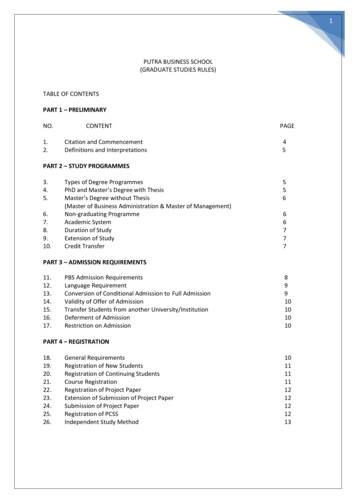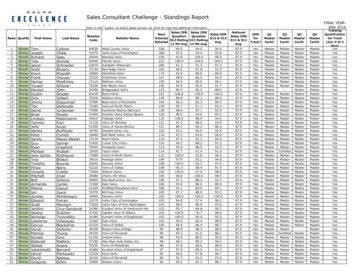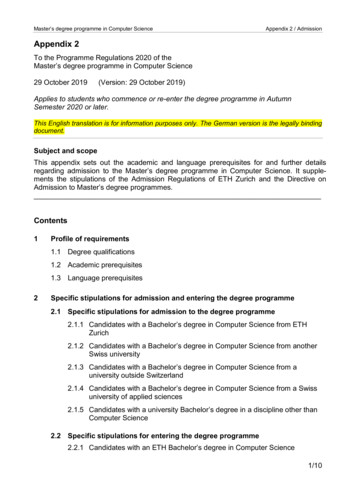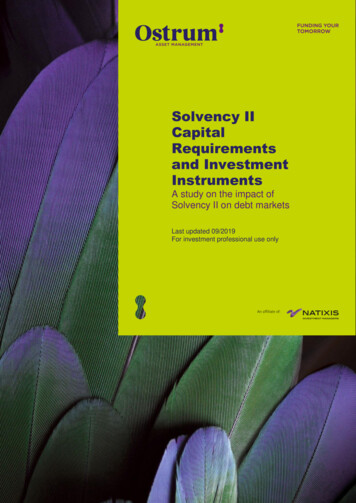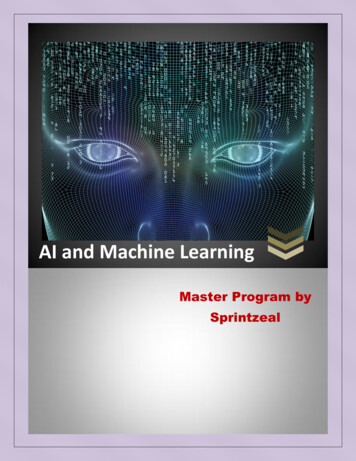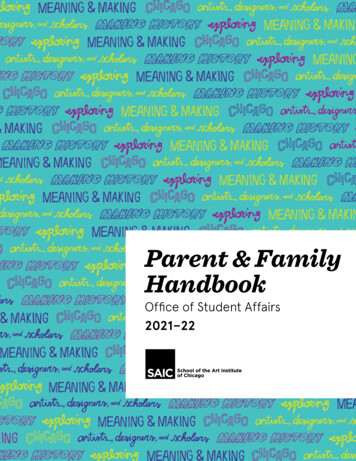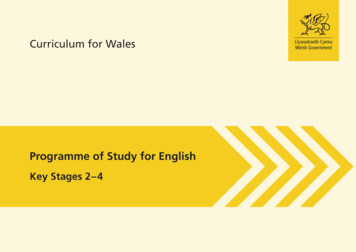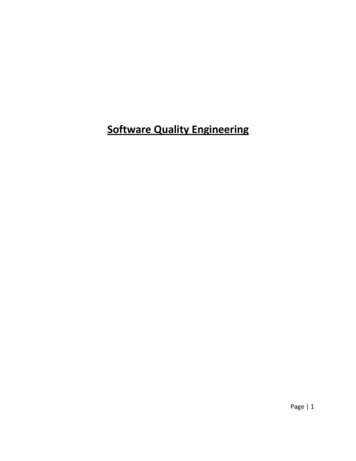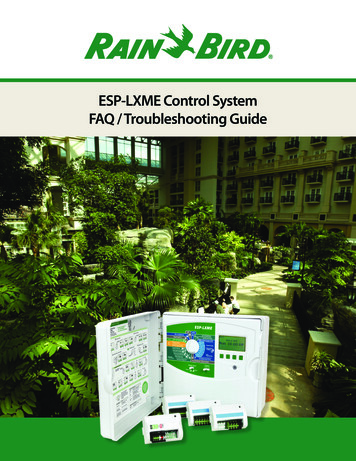
Transcription
Module HandbookStudy Programme Master in Transport and Logistics ManagementDegree awarded Master of Science (M.Sc)Effective as of:March 1st, 2019Course leader:Prof. Dr. Tobias BerneckerIssued in printed form:31.01.2020Workload:90 ECTS creditsAcademic regulations:3
Module and course unitsModuleModule coordinatorM1 Integrity and LawProf. Dr. Andreas KarkM2 Accounting and Financial ManagementProf. Dr. Stefan WilmsM3 Managing Global Supply ChainsProf. Dr. Carola SchulzM4 International Transportation ManagementProf. Dr. Tobias BerneckerM5 Operations ResearchProf. Dr. Claudia HermelingM6 Research Methods and Laboratory ProjectProf. Dr. Tobias BerneckerM7 Network Design and Inventory ManagementProf. Dr. David FrancasM8 Managing Transport NetworksProf. Dr. Dirk LohreM9 Market-based StrategyProf. Dr. Babette DornerM10 Sustainable digital ChangeProf. Dr. Roland PfennigM11 Leadership and EntrepreneurshipProf. Dr. Roland PfennigM12: Research Study: Future Logistics SolutionsProf. Dr. Tobias BerneckerM13 Management Competence (optional)Prof. Dr. Tobias BerneckerM15 Colloquium and Personality and Team CompetencesProf. Dr. Tobias BerneckerM14 Master ThesisProf. Dr. Tobias Bernecker
General learning outcomes Master in Transport and LogisticsManagementOur Master's degree program Transport and Logistics Management provides students witha high-quality, value-oriented university education, including practical career preparation.Situated in the Heilbronn-Franconia region, we consider ourselves an innovation center fortheory-based and application-relevant research. Cooperation with our external partners fromindustry and other organizations is characterized by knowledge transfer and innovation.Our program is further marked by the professional experience and different profiles of ourlecturers. In combination with various academic concepts, our standing allows us toprovide our students with a well-founded education geared to the job market. In addition,we place special emphasis on fostering their personal development.The study conditions allow for targeted and personalized learning as well as interactive workin small groups. This way, our students provenly gain both in professional and socialcompetence.
Module M1 161100 Integrity and LawDurationContact hours per week (45 mins each)Type of assessmentNumber of ECTS credits awardedPreconditions for obtaining ECTS creditsModule coordinatorProfessional competence: In-depthknowledge and comprehension1 Semester4,0Module without assessment: Grade includes individualstudent performances5,0Prof. Dr. Andreas KarkLearning objectives: acquiring knowledge aboutbusiness ethics and legal issues of business decisionsin a national and international context.Students are given the opportunity to recognize theimportance of a company's corporate ethics, complianceand corporate governance as well as gain the ability tounderstand the goals and processes of a company'scompliance and apply them accordingly in their owndecision-making situations.Professional competence: conativeskills, analysis and synthesis ofknowledgePersonal competence: Social abilitiesand skillsPersonal competence: Independence /autonomyCompetence level according GQFPrerequisites (see below)Module specificsScheduledCombined assessmentTo this end, basics of Criminal Law, Antitrust Law andCivil Damages Law are spotlighted, so that studentscomprehend the massive negative consequencescompliance violations can have for a company and theemployees involved.Gain a wide range of specialized cognitive and practicalskills within a complex, specialized, changing field oflearning, plan work processes across the board andassess them, including action alternatives andinteractions with neighboring fields. Apply knowledgelearned in a wide range of different use cases. Plan and design work processes cooperatively,including in heterogeneous groups, guide othersand support them with sound learning advice.Present complex, multidisciplinary issues in astructured, goal-oriented and audience-targetedway. Anticipate the interests and needs ofaddressees.Define, reflect and evaluate goals for learning and workprocesses and develop sustainable learning and workprocesses7
Course M1.1 161101 Integrity and LawName of lecturer(s)SemesterAvailable inMode of devliveryLanguage of instructionCourse unit title (German)Number of ECTS credits awardedContact hours per week (45 minseach)Workload: Contact hoursWorkload: Independent studiesWorkload detailsType of assessmentDuration of assessmentType of course unitPrerequisites (see below)Planned learning activities andteaching methodsProfessional competence: In-depthknowledge and comprehension(Bloom)Prof. Dr. Andreas Kark1Winter – SummerLecture including exercisesGermanIntegrität und Recht5.0, this corresponds to a workload of 150 hours4.06090Course-specific combination of assessment; concluded bya paper / presentationMandatorySeminar with exercises and case studies for self-study:Preparation and follow-up, exercises, preparation of awritten seminar paper and a presentation, cross-evaluationsLearning objectives: acquiring knowledge about businessethics and legal issues of business decisions in a nationaland international context.Students are given the opportunity to recognize theimportance of a company's corporate ethics, complianceand corporate governance as well as gain the ability tounderstand the goals and processes of a company'scompliance and apply them accordingly in their owndecision-making situations.To this end, basics of Criminal Law, Antitrust Law and CivilDamages Law are spotlighted, so that studentscomprehend the massive negative consequencescompliance violations can have for a company and theemployees involved.Professional competence: conativeskills, analysis and synthesis ofknowledgeGain a wide range of specialized cognitive and practicalskills within a complex, specialized, changing field oflearning, plan work processes across the board and assessthem, including action alternatives and interactions withneighboring fields. Apply knowledge learned in a widerange of different use cases.
Personal competence: Social abilitiesand skills Plan and design work processes cooperatively,including in heterogeneous groups, guide othersand support them with sound learning advice.Present complex, multidisciplinary issues in astructured, goal-oriented and audience-targetedway. Personal competence: Independence/ autonomyCompetence levels according toGQFCourse unit contentsRecommended optional programmecomponentsAdditional specificsAnticipate the interests and needs of addressees.Define, reflect and evaluate goals for learning and workprocesses and develop sustainable learning and workprocesses7 Origin of compliance Discussion of selected legal provisions of theAktG, GmbHG, OWiG, StGB and GWB as well asof the Treaty on the Functioning of the EuropeanUnion (TFEU) Anti-corruption law. Compliance management systemRelationship and interdependencies of corporateethics, corporate governance and compliance.Antitrust law.Data protection (overview)Export control lawSelected international regulations on the abovementioned topics.Compliance risk managementCompliance organization and processes
Recommended or required reading ScheduledCombined assessmentsKark, Compliance-RisikomanagementFissenewert, Compliance für den MittelstandMengel, Compliance und ArbeitsrechtThüsing, Beschäftigtendatenschutz undComplianceBay / Hastenrath, Compliance-ManagementSystemeHauschka (Hrsg.), Corporate CompliancePfeil / Mertgen, Compliance imAußenwirtschaftsrechtSchönke / Schröder, Strafgesetzbuch: StGB,KommentarFischer, Strafgesetzbuch, StGB, KommentarLackner / Kühl, Strafgesetzbuch : StGB,KommentarBechtold / Bosch / Brinker, EU-Kartellrecht,KommentarBechtold, Kartellgesetz: GWB, KommentarGola / Schomerus, Bundesdatenschutzgesetz,KommentarBlock course
Module M2 161110 Accounting & Financial ManagementDurationContact hours per week (45 mins each)Type of assessmentNumber of ECTS credits awardedPreconditions for obtaining ECTS creditsModule coordinatorProfessional competence: In-depthknowledge and comprehensionProfessional competence: conativeskills, analysis and synthesis ofknowledgePersonal competence: Social abilitiesand skillsPersonal competence: Independence /autonomyCompetence level according GQFPrerequisites (see below)Module specificsScheduledCombined assessment1 Semester4,0Module without assessment: Grade includes individualstudent performances5,0Prof. Dr. Stefan WilmsThis module teaches controlling and financialmanagement. The logistics-specific requirements aredefined.Students are able to deal with differentiated questions ofcontrolling and financial management. They are capableof carrying out a targeted analysis of logistics casebased tasks, identifying the relevant instrumentsrequired for solving them and of applying theseinstruments correctly. Students can interpret the resultsobtained in the context of controlling and financialmanagement as a concept of management support inorder to ensure result-oriented corporate managementand derive action-oriented conclusions.Students are able to discuss, analyze and solvedifferentiated case studies in the areas of controlling andfinancial management in small groups, in a problemoriented manner. They are capable of presenting theirideas argumentatively to other students with practicalexperience. This competence is developed, in particular,by presenting results to the group as a whole, thusfostering a skill highly relevant in their future careers.Students are able to define, reflect and evaluate goalsfor the learning and work process, and specifically plan,organize and carry out the work steps for handling morecomplex case-based tasks by themselves.7
Course M2.1 161111 AccountingName of lecturer(s)SemesterAvailable inMode of devliveryLanguage of instructionCourse unit title (German)Number of ECTS credits awardedContact hours per week (45 minseach)Workload: Contact hoursWorkload: Independent studiesWorkload detailsType of assessmentDuration of assessmentType of course unitPrerequisites (see below)Planned learning activities andteaching methodsProfessional competence: In-depthknowledge and comprehension(Bloom)Prof. Dr. Stefan Wilms1Winter – SummerLecture including exercisesGermanControlling2.5, this corresponds to a workload of 150 hours2.03045Preparation and follow-up of the course as well as exampreparation are part of the self-study workload.Written examination90 minMandatoryBasic knowledge of controllingInteractive lecture, exercises with calculation examples,case studies and case study examples, short and longpresentations by students, discussion of exercises andcase studies, mock examsThe Accounting course teaches target parameters oflogistics, its special cases of cost and activity accounting,logistics controlling and reporting. Logistics-specificrequirements for cost accounting are defined. Particularattention will be paid to the evaluation of logistical deliveryof services. Activity-based costing is introduced as anadequate tool for logistics controlling and is illustrated usingexamples from scheduled cargo traffic, warehousedistribution and business support areas.Operative and strategic logistics controlling is developed,accounting for logistics-specific requirements. Newrequirements, such as those arising from investmentcontrolling or supply chain management, are also taken intoaccount.
Professional competence: conativeskills, analysis and synthesis ofknowledgeStudents are able to deal with differentiated functionalcontrolling issues. They know how to carry out a targetedanalysis of case-based logistics tasks, identify the relevantinstruments for solving the tasks and how to apply theseinstruments correctly. Students can interpret the determinedresults in the context of controlling as a concept ofmanagement support in order to ensure result-orientedcorporate management and derive action-orientedconclusions.Personal competence: Social abilitiesand skillsStudents are able to discuss, analyze and solvedifferentiated case-based tasks related to logisticscontrolling in small groups in a problem-oriented manner.They have learned how to communicate their ideasargumentatively to other students with practical experience.This competence is developed, in particular, by presentingresults to the group as a whole, thus fostering a skill highlyrelevant in their future careers.Personal competence: Independence/ autonomyStudents are able to define, reflect and evaluate goals forthe learning and work process, and specifically plan,organize and carry out the work steps for handling morecomplex case-based tasks by themselves.Competence levels according toGQFCourse unit contents7Recommended optional programmecomponentsAdditional specifics Logistics objectivesActivity-based costingOperative logistics controllingStrategic logistics controllingSupply chain controlling
Recommended or required reading ScheduledCombined assessmentsRegularAlter, R.: Strategisches Controlling, aktuelleAuflage, München.Dillerup, R./Stoi, R.: Unternehmensführung,aktuelle Auflage, München.Eberhardt, M.; Egger, N.; Weckbach, M.:Rechnungswesen Spedition undLogistikdienstleistung, akt. Auflage, DarmstadtHorváth & Partner: Prozesskostenmanagement,MünchenHorvath, P.: Controlling, aktuelle Auflage,München.Lorenzen, K.: Logistik-Kostenrechnung, GernsbachMännel, W.: Prozesskostenrechnung, WiesbadenMännel, W.: Logistik-Controlling, Wiesbaden, akt.Aufl.Schneider, C.: Controlling für Logistikdienstleister,HamburgVarnholt N., Hoberg P., Gerhards R., Wilms S.:Investitionsmanagement, akt. Auflage,Berlin/BostonVarnholt N., Lebefromm U., Hoberg P., GerhardsR., Wilms S.: operatives Controlling, 2019Berlin/Boston.Weber, J.: Logistik- und Supply Chain Controlling,StuttgartWeber, J.: Logistikkostenrechnung, BerlinHeidelbergWilms, S.: Der Einsatz der Balanced Scorecard imBeteiligungscontrolling, in: Littkemann,J.;Zündorf,H.:Beteiligungscontrolling, Herne/Berlin2004,S.497-520.
Course M2.2 161112 Financial ManagementName of lecturer(s)SemesterAvailable inMode of devliveryLanguage of instructionCourse unit title (German)Number of ECTS credits awardedContact hours per week (45 minseach)Workload: Contact hoursWorkload: Independent studiesWorkload detailsType of assessmentDuration of assessmentType of course unitPrerequisites (see below)Planned learning activities andteaching methodsProfessional competence: In-depthknowledge and comprehension(Bloom)Sebastian Prexl1Winter – SummerLecture including exercisesGermanFinanzmanagement2.5, this corresponds to a workload of 150 hours2.03045Written examination90 minMandatory Basic knowledge of accounting, investmentand financing Basic knowledge of ExcelThis course is a seminar course. Scientific concepts are developed step by step ina dialog between students and lecturers as well asin group work. The acquired knowledge is deepened andpracticed with examples and Excel models testedin practice. Students are able to name and present theessential contents of financial management. Students recognize that financial managementrepresents the complex world of a company andits environment in figures. Students interconnect their knowledge from otherareas of their studies and financial management(purchasing/logistics, production, finance,accounting, corporate management, economics,etc.).
Professional competence: conativeskills, analysis and synthesis ofknowledgePersonal competence: Social abilitiesand skills Upon successful completion of the course,students will be able to apply the elementaryconcepts and methods of financial management. They will use methods to solve tasksmathematically. They develop and apply modelsin Excel. Students actively participate in the seminardiscourse. They work in groups Personal competence: Independence/ autonomyStudents critically examine modern capital markettheory, its practical application and assess its limits.Prior and subsequent to attendance-required times,students independently supplement teachingmaterial and deepen their knowledge with therecommended reading and exercises. Competence levels according toGQFCourse unit contentsRecommended optional programmecomponentsAdditional specificsRecommended or required readingScheduledCombined assessments7 Tasks of financial managementAnalysis of annual reportsCorporate financeInvestment calculationCapital market theoryCash value of the moneyCash flowsRisk and returnCost of capitalBusiness valuationBondsBerk/DeMarzo: Grundlagen der FinanzwirtschaftErnst/Häcker (Hrsg.) Prexl (Autor): FinancialModeling (2.Auflage)Block course
Module M3 161120 Managing Global Supply ChainsDurationContact hours per week (45 mins each)Type of assessmentNumber of ECTS credits awardedPreconditions for obtaining ECTS creditsModule coordinatorProfessional competence: In-depthknowledge and comprehensionProfessional competence: conativeskills, analysis and synthesis ofknowledgePersonal competence: Social abilitiesand skillsPersonal competence: Independence /autonomyCompetence level according GQFPrerequisites (see below)Module specificsScheduled1 Semester4,0Module without assessment: Grade includes individualstudent performances5,0Prof. Dr. Carola SchulzStudents acquire knowledge about challenges andtrends in SCM through examples of how to deal withthem. They learn how to collect, process and analyzerelevant information for decision making. Students gainan understanding of how to prepare a negotiation andhow to use it specifically to achieve their goals. Studentsdeepen their knowledge and understanding of a pastbusiness decision/constellation through reflection anddidactic preparation.Students learn to filter decision-relevant information froma case study and to prepare it in a structured way forgroup discussion. Students learn how to prepare for andconduct negotiations and discussions in a targetedmanner. In group work, students learn to reflect on pastdecisions and company constellations and prepare themin a structured, target group-oriented andcomprehensible way.By working together in small groups, students learnabout team structures and how to state and defend theiropinion. They assume different roles in the process.They also learn to present their goals in a negotiationand to prepare, communicate and defend theirknowledge in presentations, discussions or othercommunicative ways in a target-group-appropriate way.Students learn to prepare negotiations independently.They are empowered to develop and evaluate optionsfor action and present their opinions in a group or beforea decision-making body. They reflect essential findingsof a past operational decision/constellation and bringthem together with the ideas of the other groupmembers.7
Combined assessment Individual cooperationWritten assignment/presentation of casestudy(s) in group workWritten group work assignment and itspresentation/moderationDetails are announced during the first lectures.
Couse M3.1 161121 Managing Global Supply ChainsName of lecturer(s)SemesterAvailable inMode of devliveryLanguage of instructionCourse unit title (German)Number of ECTS credits awardedContact hours per week (45 minseach)Workload: Contact hoursWorkload: Independent studiesWorkload detailsType of assessmentDuration of assessmentType of course unitPrerequisites (see below)Planned learning activities andteaching methodsProf. Dr. Carola Schulz1Winter – SummerLecture including exercisesEnglishGestaltung internationaler Wertschöpfungsketten5.0, this corresponds to a workload of 150 hours4.06090Course-specific combination of assessment; concluded bya paper / presentationMandatoryFundamentals of logistics (technical terms, basic concepts)should be known.Case studies, practical exercises (e.g. role-plays,simulation), group work with presentations and discussionsProfessional competence: In-depthknowledge and comprehension(Bloom)Students acquire knowledge about challenges and trends inSCM through examples of how to deal with them. Theylearn how to collect, process and analyze relevantinformation for decision making. Students gain anunderstanding of how to prepare a negotiation and how touse it specifically to achieve their goals. Students deepentheir knowledge and understanding of a past businessdecision/constellation through reflection and didacticpreparation.Professional competence: conativeskills, analysis and synthesis ofknowledgeStudents learn to filter decision-relevant information from acase study and to prepare it in a structured way for groupdiscussion. Students learn how to prepare for and conductnegotiations and discussions in a targeted manner. In groupwork, students learn to reflect on past decisions andcompany constellations and prepare them in a structured,target group-oriented and comprehensible way.
Personal competence: Social abilitiesand skillsBy working together in small groups, students learn aboutteam structures and how to state and defend their opinion.They assume different roles in the process. They also learnto present their goals in a negotiation and to prepare,communicate and defend their knowledge in presentations,discussions or other communicative ways in a target-groupappropriate way.Personal competence: Independence/ autonomyStudents learn to prepare negotiations independently. Theyare empowered to develop and evaluate options for actionand present their opinions in a group or before a decisionmaking body. They reflect essential findings of a pastoperational decision/constellation and bring them togetherwith the ideas of the other group members.Competence levels according toGQFCourse unit contents7 Trends and challenges in managing global valuechainsSustainability in SCMNegotiations in the context of SCMAdditional topics according to the choice ofstudents Recommended optional programmecomponentsAdditional specificsRecommended or required readingScheduledCombined assessments Case studies and literature forpreparation are provided by the lecturer Lecture notes in ILIAS with literature referencesRegular Individual cooperationWritten assignment/presentation ofcase study(s) in group workWritten group work assignment and itspresentation/moderationDetails are announced during the first lectures.
Module M4 161130 International Transportation ManagementDurationContact hours per week (45 mins each)Type of assessmentNumber of ECTS credits awardedPreconditions for obtaining ECTS creditsModule coordinatorProfessional competence: In-depthknowledge and comprehensionProfessional competence: conativeskills, analysis and synthesis ofknowledgePersonal competence: Social abilitiesand skillsPersonal competence: Independence /autonomyCompetence level according GQFPrerequisites (see below)Module specificsScheduledCombined assessment1 Semester4,0Module without assessment: Grade includes individualstudent performances5,0Prof. Dr. Tobias BerneckerStudents learn the particularities of management ofinternational transports in the course of the lecture.Particular emphasis is placed on intermodal transportand the regulations for cross-border transport.Students learn how to use and assess various sourcesof information in order to design, commission, carry outand monitor international transports on a valid basis.Students learn to link economic, ecological andtechnological dimensions of international transport witheach other in a management-oriented way, in order toinstruct employees competently in corresponding tasks.Students practice taking on management tasks in theinternational transport sector and to present their owndecisions towards a group.7 Presentation performance (50 %)Final exam (50 %)
Course M4.1 161131 International Transportation ManagementName of lecturer(s)SemesterAvailable inMode of devliveryLanguage of instructionCourse unit title (German)Number of ECTS credits awardedContact hours per week (45 minseach)Workload: Contact hoursWorkload: Independent studiesWorkload detailsType of assessmentDuration of assessmentType of course unitPrerequisites (see below)Planned learning activities andteaching methodsProfessional competence: In-depthknowledge and comprehension(Bloom)Dr. Joachim Koch1Winter – SummerLecture including exercisesEnglishManagement internationaler Transporte5.0, this corresponds to a workload of 150 hours4.06090Course-specific combination of assessment; concluded bya written examination120 MinutesMandatoryLecture with accompanying exercises (presentations) andfinal examStudents learn the particularities of management ofinternational transports in the course of the lecture.Particular emphasis is placed on intermodal transport andthe regulations for cross-border transport.Professional competence: conativeskills, analysis and synthesis ofknowledgeStudents learn how to use and assess various sources ofinformation in order to design, commission, carry out andmonitor international transports on a valid basis.Personal competence: Social abilitiesand skillsStudents learn to link economic, ecological andtechnological dimensions of international transport witheach other in a management-oriented way, in order toinstruct employees competently in corresponding tasksPersonal competence: Independence/ autonomyStudents practice taking on management tasks in theinternational transport sector and to present their owndecisions towards a group.Competence levels according toGQF7
Course unit contentsRecommended optional programmecomponentsAdditional specificsRecommended or required readingScheduledCombined assessments Design of international transport chains Interaction between freight forwarder / carrier /customer in international transportDevelopment of intermodal transport offers special features of cross-border transport(INCOTERMS, customs clearance, etc.)Regular Presentation performance (50 %)Final exam (50 %)
Module M5 161140 Operations ResearchDurationContact hours per week (45 mins each)Type of assessmentNumber of ECTS credits awardedPreconditions for obtaining ECTS creditsModule coordinatorProfessional competence: In-depthknowledge and comprehensionProfessional competence: conativeskills, analysis and synthesis ofknowledgePersonal competence: Social abilitiesand skillsPersonal competence: Independence /autonomyCompetence level according GQFPrerequisites (see below)Module specificsScheduledCombined assessment1 Semester4,0Module without assessment: Grade includes individualstudent performances5,0Prof. Dr. Claudia HermelingOperations Research is concerned with thedevelopment and application of quantitative methodsthat support decision-making processes. The courseprovides an insight into the fundamentals of operationsresearch and an overview of various methods foroptimizing operational and logistical processes.In particular, examples and applications from the field ofOperations Management will be covered.Students should be able to master the presentedquantitative methods of operations research, modifythem and apply them to concrete operational andlogistical questions. They should be able to adequatelymodel problems mathematically and apply the learnedmethods to new and unfamiliar problems.During the lecture, students are encouraged to formulateand defend their own solutions to problems and todiscuss problems and solutions in working groups.Students should follow up on exam materialindependently or in learning groups and work on theexercises provided.7
Course M5.1 161141 Operations ResearchName of lecturer(s)SemesterAvailable inMode of devliveryLanguage of instructionCourse unit title (German)Number of ECTS credits awardedContact hours per week (45 minseach)Workload: Contact hoursWorkload: Independent studiesWorkload detailsType of assessmentDuration of assessmentType of course unitPrerequisites (see below)Planned learning activities andteaching methodsProfessional competence: In-depthknowledge and comprehension(Bloom)Prof. Dr. Claudia Hermeling1Winter – SummerLecture including exercisesGermanOperations Research5.0, this corresponds to a workload of 150 hours4.0Professional competence: conativeskills, analysis and synthesis ofknowledgeStudents should be able to master the presentedquantitative methods of operations research, modify themand apply them to concrete operational and logisticalquestions. They should be able to adequately modelproblems mathematically and apply the learned methods tonew and unfamiliar problems.Personal competence: Social abilitiesand skillsDuring the lecture, students are encouraged to formulateand defend their own solutions to problems and to discussproblems and solutions in working groups.Personal competence: Independence/ autonomyStudents should follow up on exam material independentlyor in learning groups and work on the exercises provided.Competence levels according toGQF76090Written examination120 minMandatoryLecture with integrated exerciseOperations Research is concerned with the developmentand application of quantitative methods that supportdecision-making processes. The course provides aninsight into the fundamentals of operations research andan overview of various methods for optimizingoperational and logistical processes.In particular, examples and applications from the field ofOperations Management will be covered.
Course unit contents Recommended optional programmecomponentsAdditional specificsRecommended or required reading ScheduledCombined assessmentsRegularBasic concepts, optimizationmodels and problem types of ORIntroduction to linear optimizationwith applicationsGraph theoretical basicsTransport optimization and transport problemsNetwork planning technology and projectmanagementFundamentals of integer optimization,applications and modelingIntroduction to dynamic optimizationQueuing theoryHillier, F. und G. Lieberman (2010): Introduction toOperationsResearch, Boston: McGraw HillRardin, R. (2014): Optimization in OperationsResearch, Harlow: Pearson Education Li
General learning outcomes Master in Transport and Logistics Management Our Master's degree program Transport and Logistics Management provides students with a high-quality, value-oriented university education, including practical career preparation. Situated in the Heilbronn-Franconia region, we consider ourselves an innovation center for
